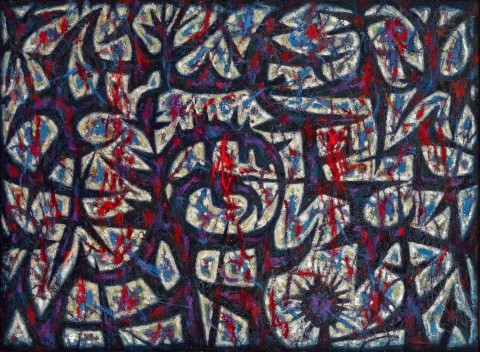THE PASSION, 1958
JOHN COBURN
oil on composition board
122.5 x 167.5 cm
signed and dated lower right: Coburn 58
Blake Prize 1958 entry label attached verso
Peter Rushforth, Sydney, acquired directly from the artist, c.1960
Thence by descent
Private collection, Sydney
Amadio, N., John Coburn Paintings, Craftsman House, Sydney, 1988, p. 195
‘John Coburn’s style is unique in Australian art and his contribution is one of inestimable worth. How does one value or rate in terms of dollars the art of a man whose vision elevates us to spiritual consciousness?’1
Unlike his contemporaries for whom abstraction represented the glorification of geometry and colour, John Coburn’s works are seldom purely cerebral or devoid of emotion. To the contrary, suffused with an overwhelming sense of celebration and allegory, his deeply personal iconography is predicated upon the promise of renewal – whether it be the regeneration of nature or the resurrection of the human spirit. Betraying strong affinities with the work of Matisse, Rothko, Picasso and Miró, his remarkable oeuvre encompassing paintings, prints and tapestries is thus motivated by an endearing admiration for the beauty of the created world and its creator, both of which he reveals and exalts through the most direct of images. Indeed, highlighting the profound spiritual significance of his art, Nadine Amadio suggests Coburn as a pilgrim, ‘…his signs and symbols speak[ing] eloquently of a man who has been prepared to make a journey and return with the gifts of his insight.’2
Significantly, Coburn staunchly rejected religion during his teenage and early adult years, only converting to Catholicism in 1953 after meeting his future wife, Barbara Woodward (who would later become one of the country’s foremost silkscreen printmakers). Equally influential upon the artist’s evolving interest in more sacred subjects was Father Scott - an organiser of the prestigious Blake Prize for Religious Art to which Coburn had submitted various entries throughout the fifties, before eventually winning the coveted award in 1960 with his celebrated triptych, The Passion, 1960 (Catholic Institute of Sydney). Featuring blues and reds with the shapes of the sharpest pain to depict three aspects of the Passion - The Scourging, The Crucifixion and the Crowning of Thorns – this monumental work of immense dynamic tension and true religious feeling not only attracted widespread critical acclaim, but was instrumental in establishing Coburn’s reputation as one of the leading Australian artists of his generation.
Painted two years’ prior, The Passion, 1958 on offer here was gifted by the artist to Peter Rushworth, a well-known potter (and father of the current owners) who met Coburn while they were both teaching at East Sydney Technical College in Darlinghurst, later to become the National Art School, Sydney. Unlike other works from these formative years which remain figuratively inclined such as Crucifixion, 1959, in which the figure of Christ on the cross is surrounded by the sharply-pointed shapes against a backdrop of red, or Litany, 1958 with its floating geometric forms suggestive of Church ceremony, the present directly prefigures the prize-winning triptych in its more abstract, fully integrated structure of organic, thorn-like forms offset by spatters of blue and blood-red paint. Although vividly conveying the agony and humiliation of Christ, there is, however, no wild cry of anguish or unrestrained emotion. Rather, like the best of Coburn’s achievements, the work is imbued with a quiet passion and deep humanity – its subtle yet powerful symbolic language the poignant expression of one man’s profound belief in his religion.
1. Strzynecki, P., 'Beyond Psalm 46' in John Coburn, Australian Galleries, Melbourne, 2000, p.8
2. Amadio, N., John Coburn: The Paintings, Craftsman House, Sydney, 1988, p. 10
VERONICA ANGELATOS
